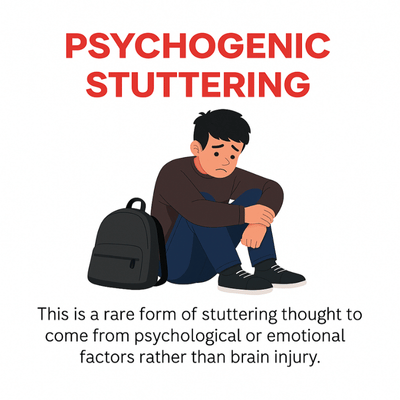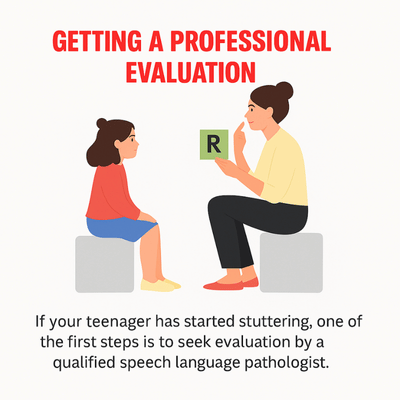

Hearing your teenager start to stutter all of a sudden can be scary. You might wonder if something went wrong or if a health issue is to blame. The good news is that while sudden stuttering in teenager situations is uncommon, it does not mean your child has a serious problem like brain tumors or deep trauma.
Stuttering can begin during teen years even without obvious triggers. This guide will walk you through what stuttering is, why it might appear suddenly, and how you can support your child through it. We cover causes from developmental stuttering to rare neurogenic stuttering, signs to watch for, and treatment options like speech therapy with a speech language pathologist to help your teen improve speech fluency and confidence.
By understanding the situation and knowing steps to take, you can feel more ready to help your teenager cope and thrive.
Table of Contents
What Is Stuttering and How Does It Show Up in Teens?

Stuttering is a speech disorder marked by breaks in the normal flow of speech. People who stutter know exactly what they want to say, but words don’t always come out smoothly. They may repeat sounds or certain syllables, stretch out sounds, or get “stuck” with blocks where no sound comes for a moment.
Your teen might get caught saying “I-I-I can’t f-f-find my book,” or draw out words like “Sssss-so I was thinking.” These breaks in speech can be frustrating. Often you’ll notice signs like face tension, rapid blinking, or other physical struggle as your teen tries to push words out.
Stuttering is one of several fluency disorders, meaning it affects the rate and rhythm of speech. It varies widely. Many people who stutter find symptoms get stuttering worse under stress or fatigue. For instance, if your teen feels anxious, excited, tired, or under pressure like speaking in front of class, stuttering may increase. On the flip side, stuttering tends to disappear during activities like singing or speaking in unison with others.
Typical Onset vs Teen Onset
In most cases, stuttering begins in early childhood. Developmental stuttering usually first appears when children are about 2 to 5 years old, as they rapidly develop speech and language abilities. About 95% of stuttering starts before age 4, and nearly all by age 7 or 8.
Most children (about 60-80%) outgrow developmental stuttering naturally during early childhood. Studies suggest that if stuttering will resolve on its own, it usually does by around age 7 or 8. However, for some kids, stuttering does not fully go away. This is called persistent stuttering, where the child continues to stutter into later childhood, teen years, and even adulthood.
So what about a teenager who never stuttered before and suddenly starts now? This scenario can be puzzling because true new stuttering cases after childhood are rare. Studies show that after about age 12, new onsets are minimal. While uncommon, sudden stuttering symptoms can happen occasionally.
When a teen who has been fluent all their life suddenly develops a stutter, medical professionals consider different possibilities. The key point is that late-onset stuttering in a teenager, while uncommon, is real and can have various underlying causes.
Why Would a Teenager Start Stuttering Suddenly?
When stuttering begins or returns in teen years, it can stem from several causes. We can think of two main categories: late developmental stuttering or acquired stuttering due to specific events.
Late-Onset Developmental Stuttering

Sometimes a teen’s “sudden” stutter might actually be developmental stuttering showing up late. Perhaps the teen had only very mild speech difficulties as a young child that went unnoticed. Due to changes in development or environment, the stutter becomes more obvious in teen years.
The brain’s development can hit bumps even in early teen years. Puberty is a time of major brain changes with neural pruning and growth spurts. If something was on the edge during early childhood, these changes might trigger speech difficulties to emerge. During adolescence, the brain undergoes significant reorganization that can affect speech and language abilities in unexpected ways.
This kind of late-onset developmental stuttering is not caused by outside trauma or injury. It’s essentially the same condition as childhood stuttering, just appearing later. Despite the late timing, the underlying causes are similar to those for younger kids, such as differences in brain structure or genetic factors. Young adults going through this phase may find that stress from academic pressures or social situations makes the stuttering more noticeable.
Acquired Stuttering
If a teenager truly had no history of stuttering ever, and then starts stuttering rather suddenly, doctors will consider acquired causes. Acquired stuttering happens when a fluency problem arises because of something affecting the brain or mind.
Neurogenic Stuttering
This occurs when there is damage to the brain or nervous system that disrupts normal speech fluency. For instance, a traumatic brain injury such as a concussion from an accident or sports, a stroke, or the presence of brain tumors could lead to stuttering-like speech problems.
Neurogenic stuttering often comes on suddenly following the brain injury. It’s not common in teens, but it can happen. Concussions and head injuries can occur in teen years. While strokes or brain tumors are rare in this age group, they are possible. Neurodegenerative diseases, though extremely rare in teenagers, could also potentially cause speech problems.
With neurogenic stuttering, the speech problems might sound different from developmental stuttering. The patterns may be more consistent across different speaking situations and might not improve with techniques that typically help childhood onset fluency disorder, like singing or speaking in rhythm.
If a brain cause is suspected, it’s important to consult medical professionals. The teen might need evaluation by healthcare provider, which could include brain scans like MRI or CT to rule out conditions such as tumors or evidence of injury. These tests help doctors understand if there are any structural changes in the brain that could affect speech and language processing.
Often doctors don’t find anything serious – many brain scans come back normal for teens with sudden stuttering, which is relief. However, because late-onset stuttering is unusual, medical evaluation is generally recommended to ensure nothing serious is being missed.
Psychogenic Stuttering

This is a rare form of stuttering thought to come from psychological or emotional factors rather than brain injury. Emotional trauma or extreme stress can, in uncommon cases, lead to sudden stuttering in someone who previously spoke fluently.
For example, there are reports of people beginning to stutter after deeply traumatic events or during severe post traumatic stress disorder. In psychogenic stuttering, there is no structural damage to speech areas of the brain. Instead, emotional turmoil affects speech on a psychological level.
Teens face considerable emotional pressure during these developmental years. Something like death of a loved one, abuse, family crisis, or other major trauma could potentially trigger stuttering in a vulnerable teen. The connection between mental health and speech is complex, and severe emotional problems can manifest in various ways, including speech difficulties.
It’s important to note that everyday stress or anxiety by themselves do not cause typical developmental stuttering. For most people who stutter, anxiety makes stuttering worse but isn’t the original cause. However, in psychogenic stuttering, the stuttering itself is a symptom of an acute psychological issue that needs attention from mental health professionals.
Other Contributing Factors
Beyond the classic causes, there are other factors that could contribute to sudden stuttering:
Medications
Certain drugs can trigger stuttering, a recognized speech disorder in the Statistical Manual of Mental Disorders. A recent systematic review linked seizure medications, high stimulant doses, and some psychiatric prescriptions to sudden stuttering on certain syllables. Parents often notice a child stutters when reading aloud or using electronic devices for class; if a child stutters soon after a new prescription, record the change.
When a child stutters repeatedly, it may evolve into persistent stuttering. Consult a healthcare provider promptly. Adjusting dosage or switching medicine can improve speech fluency, lessen stuttering, and restore typical speech for children younger.
Environmental Factors

Environmental factors can magnify a tendency toward stuttering. Most children who show stuttering in early speech years outgrow it, yet teenage stress can disrupt the normal flow of speech, turning stuttering into persistent stuttering. Divorce, a new school, or exams may prompt the teen to repeat a whole word, increasing stuttering, harming self esteem, and taxing mental health.
The Stuttering Foundation reports that social pressure and academics raise stuttering rates and strain adolescent mental health. If escalating stuttering blocks speech clarity, a healthcare provider in communication disorders can craft therapy to strengthen speech, support mental health, and help the teen overcome stuttering. Most children improve when families model slow speech.
Genetic Factors and Brain Differences
Behind all these possibilities, there are often underlying factors like family history and brain differences that make someone more likely to stutter. Stuttering tends to run in families – if you or a close relative stuttered, your teen has higher risk. Studies state you’re about three times more likely to stutter if a first-degree relative stutters.
Brain imaging studies show that people who stutter often have differences in certain brain areas, especially regions involved in speech and language processing. These differences in brain structure aren’t visible and don’t mean any lack of intelligence. They’re just slight variations in how speech is wired. Some research suggests these differences may not become apparent until the brain reaches certain developmental milestones during adolescence.
Language Development and Processing
Sometimes stuttering emerges when language abilities become more complex. As teens develop more sophisticated vocabulary and communication skills, the increased demands on their speech system might reveal underlying vulnerabilities. This is particularly true for teens who are learning multiple languages or who have other speech processing differences.
Several factors can contribute to fluency disorders in teenagers, including genetic tendency, brain differences, and environmental triggers. The important thing is to approach the situation with an open mind. No one is at fault for stuttering – it’s not caused by “bad parenting” or a teen “being nervous.” Stuttering is fundamentally a biological condition.
Recognizing Stuttering Symptoms in Your Teen
You likely already sense what stuttering looks and sounds like from observing your teen. But it’s useful to clearly identify the stuttering symptoms and behaviors they may show.
Core Stuttering Behaviors

Repetitions: This can be repeating sounds, syllables, or whole word segments – like “c-c-c-cat” or “and-and-and then we left.” Sound repetitions are often the most noticeable, especially when they occur on the first sound of a word. Repetition is one of the most common patterns, especially at the start of sentences or on certain trigger words that consistently give the teen trouble.
Prolongations: This is when a sound is stretched out longer than normal. For example, “sssssssometimes I feel nervous,” where the “s” sound is prolonged. The teen may appear to be trying to push through the sound, and it can last anywhere from a second to several seconds. Prolongations often involve continuous sounds like “s,” “m,” or vowel sounds.
Blocks: In a block, the mouth is positioned to speak but no sound comes out for a moment. It’s as if the word is stuck completely. You might see your teen’s jaw or lips in place for a sound, visible tension in their face or neck, but there’s a silent pause and then the word might suddenly release. Blocks can be particularly frustrating because the teen knows exactly what they want to say but cannot get it out.
Interjections and Fillers: While fillers like “um,” “uh,” “like,” or “you know” are normal in everyone’s speech to some extent, people who stutter might use them more frequently as a strategy. They may insert these fillers when anticipating difficulty with upcoming words, essentially buying time or avoiding the stutter.
Word Substitutions: A teen might quickly switch to a different word if they feel stuck on one. For example, if they anticipate trouble with “definitely,” they might say “for sure” instead. This word switching is an attempt to dodge the stutter, though it can sometimes result in awkward phrasing or incomplete thoughts.
Secondary Behaviors
Physical tension or movement: Watch for things like lip tremors, jaw tightening, rapid eye blinks, or facial tics when they’re trying to speak. Some teens might nod their head, tap a foot, or clench a fist during a stutter.
Avoidance behaviors: Over time, a teen may try to avoid stuttering by avoiding speaking situations or certain words. They might avoid saying their own name or difficult words, or steer conversations in ways that let them speak less.
Signs of self-consciousness: You might notice your teen covers their mouth when speaking, looks away, or withdraws from conversations. These aren’t symptoms of stuttering but rather coping methods because they’re very aware of their speech.
Emotional and Social Signs
Pay attention to how stuttering might affect your teen’s feelings about communication. Teen years are when fitting in feels crucial, and differences can feel magnified. If your child has begun stuttering, they might feel embarrassed, frustrated, or ashamed.
Unfortunately, teens who stutter can be at risk of bullying or teasing from peers. This can be hurtful and damage self esteem. Watch for signs of withdrawal: Are they talking less than they used to, even at home? Studies show that nearly 40% of teens who stutter also have anxiety or depression – likely as a result of the social and emotional challenges stuttering can bring.
Getting a Professional Evaluation

If your teenager has started stuttering, one of the first steps is to seek evaluation by a qualified speech language pathologist, commonly known as a speech therapist. A speech therapist specializes in communication disorders including fluency disorders like stuttering and can assess your teen’s speech to confirm the diagnosis, gauge severity, and recommend action.
You do not need to wait or “see if it goes away.” Since sudden stuttering in a teen is unusual, it’s wise to get a professional opinion sooner rather than later.
What to Expect in an Evaluation
The speech language pathologist will typically listen to your teen speak in various situations to observe the stuttering behaviors. They will likely ask about when and how the stuttering began, how it has changed over time, and in what situations it gets better or worse.
They’ll also ask about your teen’s health history and development. Be prepared to discuss things like: Was there any traumatic brain injury or health event around the time this started? Any major emotional events or stressors? Any family history of stuttering or other speech problems?
In some cases, especially if something in the history is concerning, the speech therapist or your pediatrician might refer you for medical workup. This could involve seeing a neurologist or getting imaging tests to rule out brain causes.
Generally, medical tests aren’t needed for typical developmental stuttering, but for acquired stuttering, tests like MRI or CT scan can be important to check for things like strokes or tumors if there are any warning signs. Often everything comes back normal, which is reassuring.
When to See a Doctor
Experts say that if stuttering begins during teen years, you should consult a professional rather than taking a “wait and see” approach. Unlike a toddler’s stutter, which we often watch for a few months to see if it resolves, a teen’s new stutter warrants more immediate attention.
If the stuttering comes with any other concerning symptoms – for example, changes in coordination, sudden language confusion, or changes in personality – that would definitely merit a thorough medical check. However, those situations are not common with just a stutter.
Treatment Options for Stuttering in Teenagers

There is no single “magic cure” for stuttering. However, there are effective stuttering treatments and strategies that can greatly help your teenager improve speech fluency and communicate more confidently.
The goal of stuttering treatment is not necessarily to eliminate every stutter. Complete fluency 100% of the time is unrealistic. Instead, the aims are typically: reducing frequency and severity of stuttering, teaching techniques to manage moments of stutter when they occur, improving the speaker’s ease and comfort, and addressing emotional impacts.
Speech Therapy with a Speech Language Pathologist
Speech therapy is the cornerstone of stuttering treatment. Working with a speech pathologist who has experience in fluency disorders can make a world of difference. In therapy, your teen will learn various techniques to manage stuttering.
Fluency Shaping Techniques
Fluency shaping techniques are core to speech therapy programs. During speech therapy sessions, a speech language pathologist or speech therapist targets developmental stuttering by reshaping everyday speech. The clinician may teach your teen prolonged speech, gentle easy onsets, a slower speaking rate, and strategic pausing. These tools smooth speech, reduce stuttering frequency, and lower anxiety levels that often rise when stuttering blocks occur.
Repeated practice in speech therapy builds muscle memory so new patterns feel natural outside the clinic and anticipate moments of stuttering. As stuttering declines, self esteem usually rises. Ongoing speech therapy also addresses related fluency disorders, giving teens lifelong strategies to manage stuttering and protect fluent speech even when unexpected stuttering surfaces.
Stuttering Modification Techniques
Stuttering modification techniques focus on easing the moment of stuttering rather than eliminating it. In intensive speech therapy, a speech language clinician shows how to notice when a stuttering block begins, release tension gradually, and finish the word smoothly. This reframes stuttering as a manageable speech disorder, boosting self esteem because the child stutters with less fear. Repeated speech therapy drills teach flexible patterns and reduce struggle.
The program also uses voluntary stuttering to desensitize anxiety and explores relaxation strategies that fit within broader communication disorders care, including childhood onset fluency disorder. Consistent speech therapy practice, guided by a certified speech language therapist, and ongoing home speech therapy assignments help control persistent stuttering while meeting medical standards set for speech language services.
Confidence-Building
Confidence building in intensive speech therapy is vital in teen stuttering care and boosts self esteem. During speech therapy the speech language pathologist addresses the fear and avoidance linked to stuttering. The clinician sets up role plays such as ordering food or joining chats, so the teen practices stuttering and embraces stuttering.
Consistent speech therapy exposure reduces anxiety tied to persistent stuttering and raises self esteem. Structured speech therapy homework includes voluntary stuttering in interactions to show that speech works. Teens whose stuttering follows an injury receive the same focus in speech therapy plans. As self esteem rises, stuttering becomes a manageable part of everyday communication even during stuttering episodes.
Education and Acceptance
The therapist will also educate your teen about stuttering – how it’s nobody’s fault, how even after therapy some stuttering might remain (and that’s okay). By understanding that stuttering is nothing to be ashamed of, the teen can shift their mindset.
Speech therapy is usually tailored to your teen’s individual needs. Over time, many teens see significant improvements. They may not become completely “stutter-free,” but they often learn to speak more easily and with more confidence.
Cognitive Behavioral Therapy and Counseling
Addressing the emotional side of stuttering is often crucial, especially for a teenager who might be feeling a blow to their confidence. Cognitive behavioral therapy is a form of psychological counseling that helps people identify and change negative thought patterns and behaviors.
For a teen who stutters, cognitive behavioral therapy can help with issues like social anxiety, fear of speaking, and low confidence. Studies state that combining speech therapy with cognitive behavioral therapy techniques can be very effective.
If your teen seems very distressed by their stutter, or if they develop significant anxiety, consider involving a psychologist or counselor. Psychological counseling is also the frontline treatment if the stutter is psychogenic (trauma-induced), because the underlying trauma needs to be addressed for speech to improve.
Support Groups and Resources
Beyond formal therapy, connecting with others who stutter can be incredibly helpful. There are organizations like the National Stuttering Association and the Stuttering Foundation that offer support groups, workshops, and conferences.
For example, the National Stuttering Association has local chapters specifically for teens and their families, where your teen can meet peers who stutter and realize they’re not alone. Simply knowing others who stutter – especially successful, normal people who stutter – can boost a teen’s morale enormously.
Practical Strategies for Parents to Support a Stuttering Teen
As a parent, you play a key role in helping your teenager navigate this challenge. Your support, understanding, and the environment you create at home can greatly influence how your teen copes with stuttering.
Educate Yourself and Your Teen

Take time to learn about stuttering from good sources. Understand that stress or parenting did not cause your child’s stutter, and that being “nervous” is not the root cause. Teach your teen these facts too – it’s important they know they did nothing to “cause” this.
Studies suggest that educating teens about how stuttering works can reduce their anxiety and improve their communication attitudes. When your teen understands that stuttering is a condition that many people manage (about 1% of the population worldwide stutters), it can reduce feelings of isolation.
Open the Lines of Communication
Don’t tiptoe around the stuttering or treat it like a shameful secret. Let your teen know that you are available to talk about the stutter – how they feel, what they want you or others to do when they stutter.
Listen more than you speak. If your teen shares frustrations, resist the urge to immediately solve or minimize. Instead, acknowledge their feelings and ensure that your child feels safe talking to you about it, without judgment.
Create a Low-Pressure Speaking Environment at Home
Give your teen time to express themselves. Don’t hurry them or finish their sentences – this can send the message that you’re impatient. Maintain natural eye contact and an attentive, patient manner when they are talking, even if they’re stuttering a lot.
Model a slightly slower speaking rate yourself, with pauses, so the overall tempo is calmer. When parents speak slower, it gives the child more time and reduces pressure, often leading to more fluent responses. Take turns talking and make sure everyone in the family listens without interrupting.
Encourage and Empower Your Teen
Focus on building your child’s confidence. Emphasize that stuttering is not a character flaw – it’s just a way of speaking. Share inspirational stories of people who stutter who have achieved their dreams. There are famous actors, athletes, and leaders who have stuttered.
Involve your teen in decisions about their communication. If they are in speech therapy, let them take some ownership. This gives them a sense of control.
Practice Supportive Listening Techniques
Be patient and avoid finishing sentences. Show active listening by nodding or using gentle cues while still allowing them time. If your teen blocks (gets stuck in silence), you might wait a little longer than feels natural – often they can break through if given time.
Normalize stuttering in conversation. If they apologize for stuttering, reassure them kindly: “You don’t need to apologize. I’m listening, take your time.” Creating an atmosphere where stuttering is not seen as a bad thing is so important.
Address Bullying and Maintain a Positive Outlook
Talk to your teen about how they want to handle it if someone teases them about stuttering. If bullying is severe or persistent, do not hesitate to involve the school. No child should have to endure bullying.
Your attitude sets the tone. Maintain hope and optimism that your teen will be okay. Let your teen know you believe in them. Highlight any progress, no matter how small. Be careful not to set unrealistic expectations like “If you work hard, you’ll stop stuttering completely.” Instead, frame it as “If we work at this, you can learn to manage it and it can bother you a lot less.”
Moving Forward with Support and Professional Help
Sudden stuttering in your teenager can certainly be unexpected. But now you have a deeper understanding of what might be happening and how best to respond.
Stuttering that begins in teen years, while uncommon, is real – and it doesn’t usually mean something dire. It could be developmental stuttering showing up late, or on rare occasions a sign of a brain injury or psychological event (which is why checking with medical professionals and a speech pathologist is wise).
Multiple factors (genetic, brain-related, emotional, environmental) can contribute to stuttering, so there’s no one single cause in most cases. There’s no overnight cure, but there are effective treatment options and strategies to help your teen speak more easily and confidently.
Speech therapy, particularly with an experienced fluency specialist, is one of the best steps you can take. If needed, adding psychological support like cognitive behavioral therapy can address any anxiety or self-worth issues.
As a parent, your supportive role is crucial. By fostering open communication, being patient and understanding, and implementing practical at-home strategies, you create a nurturing environment for improvement. Your teen’s mental health is just as important as their speech fluency.
It’s also heartening to know there’s a whole community ready to help. Organizations like the National Stuttering Association and the Stuttering Foundation offer resources, from educational materials to local support chapters.
Looking ahead, keep in mind that many people who stutter go on to lead successful, fulfilling lives. Your teen might develop greater empathy, strength, and communication skills that serve them well in life. With continued support, treatment, and natural maturation, you may see your teen make great progress.
Studies suggest that early intervention and consistent support can improve outcomes in managing stuttering. Be patient with the process. Progress might be your teen ordering their own coffee despite a stutter, or speaking on the phone without hanging up, or simply not letting a tough speech day stop them from going out with friends. These are all wins.
What matters most to your teenager is knowing that you’ve got their back. Your love and support do not waver whether they stutter on every other word or speak fluently. By showing confidence in them and providing a safe space to grow, you’re giving them the best possible gift: the freedom to find their voice.
Ready to take the next step? If your teenager has started stuttering suddenly, don’t wait to seek help. Contact a qualified speech language pathologist in your area today to schedule an evaluation. Early intervention can make a significant difference in helping your teen overcome stuttering challenges and build confidence in their communication abilities. Your teen deserves the support they need to thrive – reach out to a professional now and start their journey toward better speech fluency.





